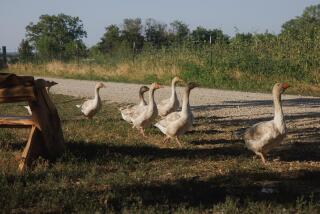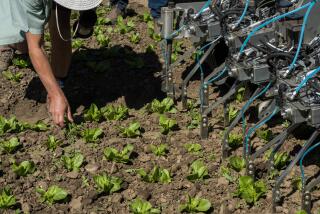An unwavering vision of food from grass
- Share via
WICHITA, Kan. _ Wes Jackson spent the past 39 years warning us that grain farmers are destroying the planet.tmpplchld With an intellect even critics say is formidable, he spent half his life trying to make eatable bread out of Kansas prairie grass seed.tmpplchld None of this got him invited to a lot of Kansas farm parties.tmpplchld “If we adopted his ideas worldwide, we’d starve,” said Barry Flinchbaugh, Kansas State University’s emeritus agricultural economics professor.tmpplchld But Flinchbaugh respects him and says we should too. And Jackson’s announcement this month that he’ll start a phased retirement on his 80th birthday next June will no doubt touch off tributes from around the world.tmpplchld At the Land Institute he founded and leads near Salina, with acreage on both banks of the Smokey Hill River, Jackson and fellow plant geneticists have spent nearly 40 years working in greenhouses and on prairie grass on what he says is a project that could take generations to complete.tmpplchld They are developing how to coax substantial amounts of eatable grain from perennial prairie grasses where the ground doesn’t ever have to be plowed, or harrowed, or saturated with weed killer every year.tmpplchld He’s long been a hero to environmentalists and intellectuals. And Flinchbaugh, though a critic, says Jackson’s science should be taken seriously.tmpplchld The foundation that hands out MacArthur genius grants awarded one to Jackson in 1992.tmpplchld In 2000 he won a Right Livelihood award _ known also as an “alternative Nobel” prize. The award is presented annually in Stockholm at a ceremony in the Swedish Parliament.tmpplchld To Wendell Berry, one of the country’s better known writers and environmentalists, Jackson is working to save the world.tmpplchld At Jackson’s Land Institute, he and an array of plant geneticists and other experts have developed plants, including “Kernza,” an eatable grain he says is the first in many steps toward feeding billions without poisoning or washing away the land.tmpplchld “You can make bread from Kernza,” Jackson said. “You can make whiskey. You can make beer.”tmpplchld Berry, a poet, novelist and a prominent environmental activist, said Jackson’s Kernza bread tastes great and that his retirement will be mourned.tmpplchld “Wes has steadily called attention to our abusive treatment of our land, especially in the landscapes of agriculture. In my opinion he is indispensable.”tmpplchld Flinchbaugh himself said Jackson is a first-rate scientist and visionary who might one day hit upon a workable way to create affordable, substantial and sustainable grassland farming.tmpplchld The problem, he said, is time: Turning grasslands into suppliers of grain is so complex and difficult that it might take scientists generations.tmpplchld “I have told him more than once that if what he is trying to do would have practical application, it would change the world,” Flinchbaugh said. “But in the meantime, we gotta eat.”tmpplchld Jackson was born on a farm near Topeka. He earned his plant genetics doctorate at North Carolina State University and eventually came back to Kansas.tmpplchld By 1978 he’d become upset about the soil erosion he saw.tmpplchld He took a field trip to the Konza Prairie in northeastern Kansas, one of the state’s natural prairie wonders.tmpplchld What captured his imagination, he said on Thursday, was not only how beautiful it was but “what was not there.”tmpplchld “No fossil fuels,” Jackson said. “No chemicals, no contaminants, no erosion. It is a beautiful system. The prairie runs by itself � and does everything except provide us with grain.”tmpplchld He began to work out how plant geneticists like himself might coax calories out of perennial prairie plants.tmpplchld In 1976, he founded the nonprofit Land Institute. From there, he worked to find partners and donors, wrote books and began to work out the genetics of how to save the planet from humans.tmpplchld If we don’t stop the soil erosion, he said, there will come a time when “there are a lot fewer of us around.”tmpplchld “I said at the beginning, in 1978, that it would not be easy,” he said. “I said it might take 50 to 100 years. We’re actually ahead of schedule here.”tmpplchld The Land Institute is conducting a national search for a new president to take Jackson’s place.tmpplchld The main objection to Jackson among traditional agriculturalists is practicality, Flinchbaugh said.tmpplchld “The only known way I know so far about how to turn grass into digestible food is to put the grass through a ruminant (a cow) first.tmpplchld “I was down there talking to Wes at his place once when he suggested we go to town for lunch,” Flinchbaugh said. “I said, ‘Why don’t we just eat some of this gamma grass you’ve got growing here?’ Needless to say, we went to town instead.”tmpplchld Flinchbaugh disputes Jackson’s assessment that farmers here and elsewhere are destroying the topsoil.tmpplchld “Most farmers I know subscribe to the notion that ‘I need to leave my place in better shape than I found it,’” Flinchbaugh said.tmpplchld “Among agriculturalists in Kansas, he’s considered as very unusual, a wild-eyed thinker.”tmpplchld None of the criticisms surprise Jackson, or his friend Berry.tmpplchld “Most of the time, the agriculture people just ignore us.”tmpplchld That’s a mistake motivated by orthodox thinking, Berry said. “And industrial agriculture is the most orthodox-thinking organization since Medieval Catholicism.”tmpplchld tmpplchld We live now in a world where no one dares drink water from a stream, and in many places, even from a faucet tap, Berry said.tmpplchld Farmers around his farm in Kentucky began plowing up their grasslands a few years back _ on hillside slopes. Their motive was good grain prices for soybeans, corn and wheat. Their results, he said, are “big gullies cutting across their fields so deep they can’t drive their machines across them.”tmpplchld “The fundamental idea that Wes based all his work on is that you have to learn to farm from nature,” Berry said.tmpplchld “If you go against nature, nature exacts a cost.tmpplchld “Nature always has the last word.”tmpplchld ___tmpplchld (c)2015 The Wichita Eagle (Wichita, Kan.)tmpplchld Visit The Wichita Eagle (Wichita, Kan.) at www.kansas.comtmpplchld Distributed by Tribune Content Agency, LLC.tmpplchld
More to Read
Sign up for Essential California
The most important California stories and recommendations in your inbox every morning.
You may occasionally receive promotional content from the Los Angeles Times.













